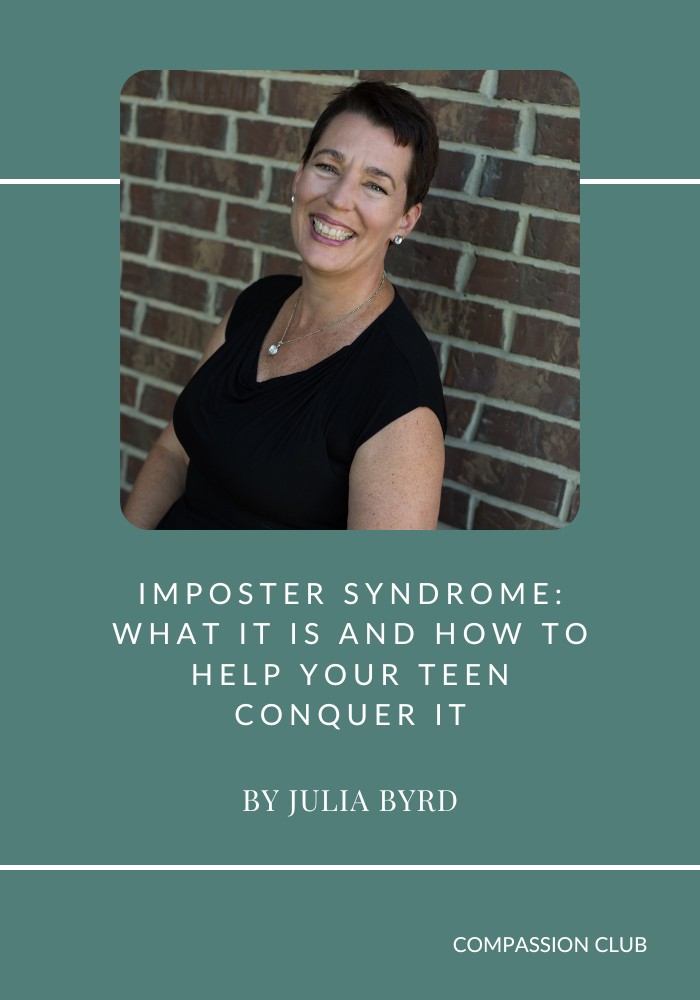THE COMPASSION CLUB
Imposter Syndrome: What It Is and
How to Help Your Teen Conquer It

Have you ever felt like you’re just not good enough at what you do? That sooner or later, someone will find out you’re a fraud and expose you to the world? That you just don’t belong?
That feeling, my friends, is imposter syndrome.
It’s that feeling of inadequacy and self-doubt that arises when you believe you’re not as capable or qualified as others think you are.
And it may show up as that nagging, annoying voice in your head that tells you that you don’t deserve the good things that have come to you. Your business. A promotion. A talent. It’s a mindset that can be incredibly damaging to your self-esteem and self-confidence, no matter what levels of success you’ve reached.
Unfortunately, many teenagers also struggle with imposter syndrome. They, too, are just as worried that they don’t deserve their good grades. That they aren’t as smart or as talented as their peers. That it’s only a matter of time before everyone else finds out.
And this limiting belief can be devastating.
So why do teenagers experience imposter syndrome?
The Reasons for Teenage Imposter Syndrome
Obviously, adolescence is a time of intense pressure and expectations. In high school, teens are expected to excel academically — to take AP and dual credit courses, to challenge themselves, and to get high GPAs. They’re also expected to excel in extracurricular activities, to get part-time jobs, and to give back to the community. They’re expected to go to college — and maybe get accepted to uber-competitive ones at that. In short, they’re generally expected to be a well-rounded, successful individual. When everyone is comparing them against someone else — class rankings, sports tryouts, auditions — it’s no wonder they’re doubting how they compare to others and are finding new ways to try and measure up.
But that’s not the only reason. Sometimes teens put unrealistic pressure on — and set unrealistic expectations for — themselves. They might believe that they need to be perfect to be successful. That, in the immortal words of Ricky Bobby in “Talladega Nights,” “If you ain’t first, you’re last.” And anything less than first is unacceptable.
While overcoming imposter syndrome is possible, it can be especially challenging for teens who are still trying to find their communities, their strengths, and their goals.
Why Imposter Syndrome Is Tough to Overcome
The teen years are a time when young people are trying to figure out who they are and where they fit in the world. So when imposter syndrome comes along, it can make them doubt their abilities and feel like they don’t belong.
They may doubt that they belong in certain social groups or may feel they aren’t good enough to achieve their goals. I’m sure we can all relate to those high school-era insecurities. I know I can. In high school, I was a cheerleader, but I didn’t fit the mold. I wasn’t exceptionally pretty or popular, and the uniforms never fit me quite right. I always felt I stood out and never felt like I’d earned my spot.
Continually doubting themselves can lead to low self-esteem and a lack of confidence in teens, which can make it difficult for them to reach their full potential.
But that doesn’t mean they can’t adjust their mindset and conquer imposter syndrome.
4 Tips for Conquering Imposter Syndrome
1. Know That Everyone Experiences It
One way to help teens combat imposter syndrome is to help them understand it’s a common experience. Tom Hanks? Lady Gaga? Tina Fey? Even they’ve struggled with imposter syndrome at some point in their lives. Don’t believe me?
In her HBO special, Lady Gaga said, “I still sometimes feel like a loser kid in high school and I just have to pick myself up and tell myself that I’m a superstar every morning so that I can get through this day.”
By realizing they’re not alone, teenagers can start to feel more confident in their abilities and less like an imposter.
2. Develop a Growth Mindset
You can develop your abilities and intelligence through hard work and learning. Believe me? If you do, then you’re perfectly positioned already with a growth mindset.
Not so sure yet? Why not give it a try? When teens embrace this mindset, they can start to see challenges and setbacks as opportunities for growth and learning — not signs of failure.
3. Build a Network
When teenagers have a support network of friends, family, and mentors who can provide encouragement and guidance, they can blast through imposter syndrome. Knowing they have people who support them and believe in them can help teens feel more confident in their abilities and remind them of their strengths when they feel challenged by obstacles.
4. Be Realistic
It can be easy to feel like a failure when you’ve set unrealistic goals and have over-the-top expectations for yourself. And because imposter syndrome can be fueled by the pressure to be perfect, having unattainable goals can make imposter syndrome feel even worse.
So let’s encourage teens to aim for the stars but shoot for the moon.
Remind your teens that it’s okay to make mistakes. Everyone has room for improvement — ourselves included. By setting realistic goals and expectations, teenagers can focus on the process of learning and growing and taking advantage of the opportunities offered them — not on achieving a certain level of perfection.
Imposter Syndrome Doesn’t Have to Be Limiting
Imposter syndrome can be a challenging experience for teenagers, but it’s one that can be conquered. By helping teenagers understand that imposter syndrome is a common experience, developing a growth mindset, building a support network, and setting realistic goals and expectations, we can help them overcome their self-doubt and reach their full potential.
MEET THE BLOGGER

Julia Byrd – The Essay Coach
BIO – Julia is a Houston-based college admission essay specialist with nearly 20 years’ experience in writing, editing, and storytelling. Combining her extensive writing background with her master’s degree in counseling psychology, she’s perfectly positioned to help students find their deepest stories, develop their voices, and write the essays that stand out to admission officers.
Working one-on-one or in small groups — in person and online — Julia leads students to recognize their accomplishments and draw unique connections between their life experiences, their values, and their college and career goals.
WEBSITE: www.essay-coach.com.
INSTAGRAM: essay_coach